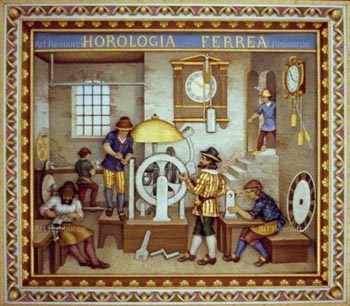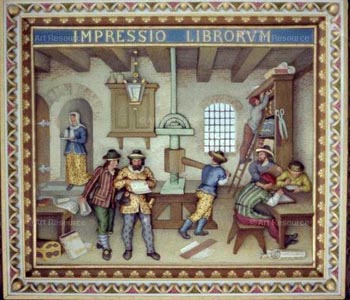 |
Socio-Political Issues
Medieval Paternalism &
Progressivist Neo-Slavery
Plinio Corrêa de Oliveira
"Even considering that the tendency and interest towards maximum productivity continues to be preeminent and absolute, private property ceased to be a development of the individual as a necessary support of his individuality in the material world. Rather, property became a negative conditioning of the individuality - this is what Christians must keep in mind. In fact, it can be affirmed – as authorized lawyers of a certainly not anti-Christian inspiration have asserted – that today it is no longer the proprietor who owns the property, but rather the property that owns the proprietor.”
Whoever professes this strange opinion reduces man not just to the condition of a salary earner or the slave of another man, but the slave of a bureaucratic and mechanical system of production – a system that has a power similar to the one an owner has over his belongings.

|
"Consider the field of penal law: we are witnessing today, on one hand, a profound transformation in the way of evaluating the seriousness of certain crimes; on the other hand, we are seeing increased generalization - which can appear censurable – of behaviors that were once considered irrelevant in penal law.
“The most serious offenses are no longer offenses made against the individual or his patrimony, but those that in any way undermine social values. Consequently, we discern that the actions that are punished today by penal law are not so much attacks against the individual or the social order of the past - understood as the absence of conflicts among individuals - but what prevents the end from being achieved, an end that has shifted from the individual and society to the State. Indeed, a crime is a crime insomuch as it is a crime against the State.”
Whoever thinks like this considers that individuals have no inherent rights, and that the State is the exclusive holder of all rights...
 |
“Man’s physical health... is no longer a mere personal good of the individual, but a good of the collectivity with its protection guaranteed by the Constitution.”
In the context of the earlier texts, we can well see where this can lead. For if the individual has no rights, the right of the State over the health of each person overshadows in an absolute way the individual’s right over his own health.
Consequently, this principle can quickly and directly lead to slavery.
Who holds these opinions so terribly steeped in the spirit of slavery? Is he some fanatic adherent of the despotic monarchy that once ruled in the East? Some cruel and heartless feudal lord as depicted in the black legend grafted onto a certain historiography currently in vogue?
No, they belong to one of those Catholic progressivists who spend their time attacking the best perennial Catholic traditions of the Middle Ages. They are the opinions of Mr. Gian Paolo Meucci, judge and professor of Constitutional Law at the University of Florence, Italy, who contributes to newspapers and magazines such as Il Popolo, L'Italia and Testimonianze. Prof. Meucci wrote the chapter "Toward Tomorrow’s State” in the very controversial book Dialogue Put to the Test (Mario Gozzini, ed., Florence: Mezzo Secolo, 1964), in which Catholics and Italian Communists collaborate.
Thus do so many progressivists who clamor against what they call medieval paternalism, which they considered a regime incompatible with human dignity. They end up by taking their idolatry of the State to the point of re-establishing a slavery typical of peoples prior to Our Lord Jesus Christ.
Regarding this paternalism in the Middle Ages, this is what Leo XIII says about trade and industrial workers:
“History attests to the excellent results that the workers’ guilds of times past achieved. They were the means of affording not only many advantages to the workmen, but in no small degree of promoting the advancement of art, as numerous monuments remain to bear witness.
“Such associations should be adapted to the demands of the age in which we live – an age of greater education, of different customs, and of far more numerous demands in daily life. It is gratifying to see that everywhere associations of this nature are being formed today, either those composed only by workmen or those with employees and employers together: We greatly desired that they become more numerous and more efficient. Although We have spoken of them more than once We want to explain here how much they are needed, their right to exist as well as indicate what should be their organization and their program of action” (Encyclical Rerum Novarum).
As one can see, the great Pontiff considers that medieval guilds should still exist in our days, with the necessary adaptations.
We feel much more at ease in the company of this great Pope who eulogizes those medieval associations, which ensure the rights of both employers and employees, than in the company of the advocates of contemporary State slavery.

Stained glass windows in Notre Dame of Paris representing different guilds |

Catolicismo n. 177, September 1965
Posted January 25, 2012

Related Topics of Interest
 Groups of Friends and Guilds Groups of Friends and Guilds
 All Classes Should Have Elites All Classes Should Have Elites
 The Decay of the Medieval Guilds The Decay of the Medieval Guilds
 Critique of Capitalism from an Organic Perspective Critique of Capitalism from an Organic Perspective
 Communitarianism & Its Plan for Society Communitarianism & Its Plan for Society
 Organic Society & City Planning Organic Society & City Planning
 Review of A Guildsman’s Interpretation of History Review of A Guildsman’s Interpretation of History

Related Works of Interest
|
|
Social-Political | Hot Topics | Home | Books | CDs | Search | Contact Us | Donate

© 2002- Tradition in Action, Inc. All Rights
Reserved
|
 |
|